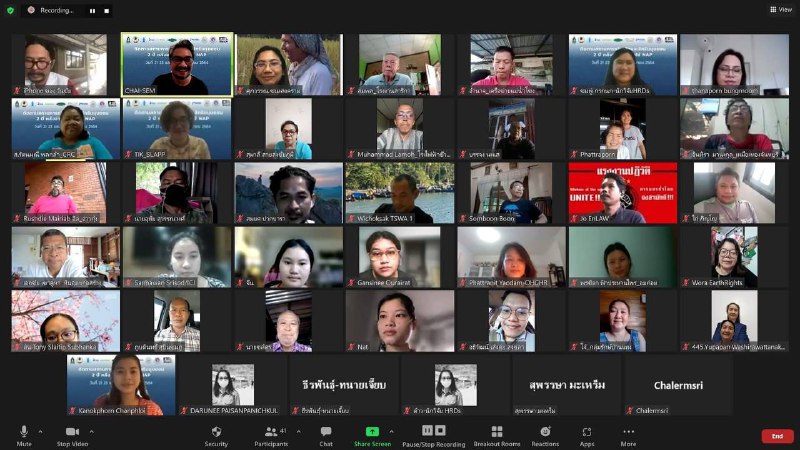On 21, 23 and 26 November 2021, the ICJ co-hosted an online discussion on “Thailand’s National Action Plan on Business and Human Rights: 2-Year Progress Review”. The forum was co-organized with other 11 organizations.
On the first and second day, participants included some 70 individuals representing populations affected by business operations from all regions of Thailand and members of civil society organizations. They reviewed the progress that has been made by Thailand over the past year towards fulfilling its commitments in the four priority issues in its First National Action Plan on Business and Human Rights (NAP): (1) Labor; (2) Land, environment and natural resources; (3) Human rights defenders; and (4) Cross border investment and multi-national enterprises.
Several participants noted a lack of any evident and tangible progress in the NAP implementation, which was made worse by the COVID-19 pandemic. Specific issues highlighted by participants in the discussions included:
- Labor: A massive increase in labor rights violations were reported across the country, with many employers using COVID-19 as an excuse to lay off workers without severance pay, payment in lieu of advance notice, and other types of compensation. Migrant workers in Thailand also had their lives and livelihoods upended by the pandemic. Their movements were discriminately restricted, including after construction camp sites were closed and guarded by Thai police and army – confining migrants in congested conditions with limited access to medicine and food. They had also been discriminatorily excluded from COVID-19 assistance packages provided by the Thai authorities;
- Land, environment and natural resources: Participatory mechanisms and consultations with people affected by land and environment-related policies and practices, as well as in the environmental impact assessment process, were inadequate, in particular by the increasing use of online mechanisms as the main platforms for consultation during the COVID-19 pandemic, despite the low rate of access to the internet among affected communities;
- Human rights defenders: Human rights defenders in Thailand were at heightened risk of intimidation and harassment through the legal process. The existing legal frameworks, including Articles 161/1 and 165/2 of the Criminal Procedure Code entered into force on 20 February 2019 and 21 March 2019 respectively, are inadequate to prevent harassment through legal processes against individuals who, in good faith, seeking to bring to light human rights concerns; and
- Cross border investment and multi-national enterprises: Barriers persist for victims to seek and obtain redress for human rights violations and abuses committed with the involvement of Thai transnational corporations abroad. These include barriers to access corporate documentation that would go to establishing the nature of the links between a parent company in Thailand and its subsidiaries in other countries. Participants also expressed concerns about the report that the National Human Rights Commission of Thailand (NHRCT) refused to investigate, document, and expose instances of human rights abuse committed by Thai transnational corporations abroad, citing the absence of express powers.
Comments and recommendations raised by participants on the first and second day were presented to representatives from the Ministry of Justice and UN agencies, in the public seminar on 26 November 2021. The outcomes of the discussion and recommendations will also be submitted to the NAP Monitoring/Steering Committees, chaired by Director-General of Rights and Liberties Protection Department, Ministry of Justice.
Background
On 29 October 2019, the Cabinet approved and adopted the First National Action Plan on Business and Human Rights (2019-2022), making Thailand the first country in Asia to adopt the stand-alone NAP.
The NAP emphasizes the duties of State agencies to review and amend certain laws, regulations and orders that are not in compliance with human rights laws and standards and ensure their full implementation; ensure accessibility of mechanisms for redress and accountability for damage done to affected communities and individuals; overcome the barriers to meaningful participation of communities and key affected populations; and strengthen the role of businesses to “respect” human rights on a variety of key priority issues.
The event was co-hosted with:
- Asian Forum for Human Rights and Development (FORUM-ASIA)
- Chiang Mai University’s Faculty of Law
- Community Resource Centre Foundation (CRC)
- EarthRights International (ERI)
- Green Peace Thailand
- Green South Foundation
- International River (IR)
- Spirit in Education Movement (SEM)
- Thai Extra-Territorial Obligations Working Group (Thai ETOs Watch)
- The Mekong Butterfly (TMB)
The recording of the discussion is available here.
Further reading
Thailand: ICJ co-hosts discussion on National Action Plan on Business and Human Rights (2019)





